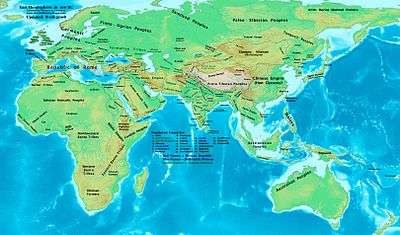100 BC
Year 100 BC was a year of the pre-Julian Roman calendar. At the time it was known as the Year of the Consulship of Marius and Flaccus (or, less frequently, year 654 Ab urbe condita). The denomination 100 BC for this year has been used since the early medieval period, when the Anno Domini calendar era became the prevalent method in Europe for naming years.
| Millennium: | 1st millennium BC |
|---|---|
| Centuries: | |
| Decades: | |
| Years: |
| 100 BC by topic |
| Politics |
|---|
| Categories |
|
| Gregorian calendar | 100 BC XCIX BC |
| Ab urbe condita | 654 |
| Ancient Egypt era | XXXIII dynasty, 224 |
| - Pharaoh | Ptolemy X Alexander, 8 |
| Ancient Greek era | 170th Olympiad (victor)¹ |
| Assyrian calendar | 4651 |
| Balinese saka calendar | N/A |
| Bengali calendar | −692 |
| Berber calendar | 851 |
| Buddhist calendar | 445 |
| Burmese calendar | −737 |
| Byzantine calendar | 5409–5410 |
| Chinese calendar | 庚辰年 (Metal Dragon) 2597 or 2537 — to — 辛巳年 (Metal Snake) 2598 or 2538 |
| Coptic calendar | −383 – −382 |
| Discordian calendar | 1067 |
| Ethiopian calendar | −107 – −106 |
| Hebrew calendar | 3661–3662 |
| Hindu calendars | |
| - Vikram Samvat | −43 – −42 |
| - Shaka Samvat | N/A |
| - Kali Yuga | 3001–3002 |
| Holocene calendar | 9901 |
| Iranian calendar | 721 BP – 720 BP |
| Islamic calendar | 743 BH – 742 BH |
| Javanese calendar | N/A |
| Julian calendar | N/A |
| Korean calendar | 2234 |
| Minguo calendar | 2011 before ROC 民前2011年 |
| Nanakshahi calendar | −1567 |
| Seleucid era | 212/213 AG |
| Thai solar calendar | 443–444 |
| Tibetan calendar | 阳金龙年 (male Iron-Dragon) 27 or −354 or −1126 — to — 阴金蛇年 (female Iron-Snake) 28 or −353 or −1125 |
The world in 100 BC.

The eastern hemisphere in 100 BC.
Events
By place
Roman Republic
- Consuls: Lucius Valerius Flaccus, Gaius Marius (Marius's sixth consulship).
- Manius Aquillius celebrates an ovation for victories in the Second Servile War.
- Lucius Appuleius Saturninus, a tribune, passes a law to redistribute land to military veterans. The law requires that all senators swear to abide by it. Quintus Caecilus Metellus Numidicus refuses and is exiled. He goes to Rhodes to study philosophy.
- Late summer–autumn: Saturninus stands for tribune again for the following year, and is elected. His associate, the praetor Gaius Servilius Glaucia, attempts to stand for the consulship (illegally, as praetors cannot immediately become consul). A rival candidate, Gaius Memmius, is found murdered by agents of Saturninus and Glaucia, who are declared public enemies by the Senate. The Senate issues the senatus consultum ultimum, and Marius, as consul, defeats his former ally in battle in the Forum. Saturninus and his followers surrender on condition that their lives are spared, but they are stoned to death with roof tiles in the Curia Hostilia by renegade senators.
- The building of the Sanctuary of Fortuna Primigenia, Palestrina, Italy, is begun. The model of it is now kept at the Museo Archeologico Nazionale, Italy (approximate date).
Asia Minor
Judea
- The deuterocanonical books of 1 and 2 Maccabees are written.
Middle East
Asia
- Peasants revolt under Emperor Wu of Han. The Great Wall is extended out into the Gobi Desert, and sections of the wall are detached with signalling towers.
- Gandhara and Punjab are ruled by the Indo-Greek king Demetrius III Aniketos.
- A History of China is written by Sima Qian (approximate date).
Births
- Joachim, father of Mary, the mother of Jesus
- Julius Caesar, Roman general and politician (d. 44 BC)[1][2]
- Titus Labienus, Caesar's chief lieutenant in the conquest of Gaul (d. 45 BC)
Deaths
- Cornelia Africana, mother of Tiberius Gracchus (b. c. 190 BC)
- Gaius Memmius (tribune), Roman politician
- Gaius Servilius Glaucia, Roman politician
- Lucius Appuleius Saturninus, Roman politician
- Salvius Tryphon, Rebel slave
- Theodosius of Bithynia, Greek astronomer and mathematician (b. c. 169 BC)
References
| Wikimedia Commons has media related to 100 BC. |
- https://www.biography.com/people/julius-caesar-9192504
- There is some dispute over the year of Caesar's birth. Some scholars have made a case for 101 or 102 BC as the year of his birth, based on the dates that he held certain magistracies, but scholarly consensus favors 100 BC. Similarly, some scholars prefer 12 July for the day of his birth, but others give 13 July. Goldsworthy, p. 30, Ward, Heichelheim, & Yeo p. 194. For a source arguing for 12 July, see Badian in Griffin (ed.) p.16
This article is issued from Wikipedia. The text is licensed under Creative Commons - Attribution - Sharealike. Additional terms may apply for the media files.